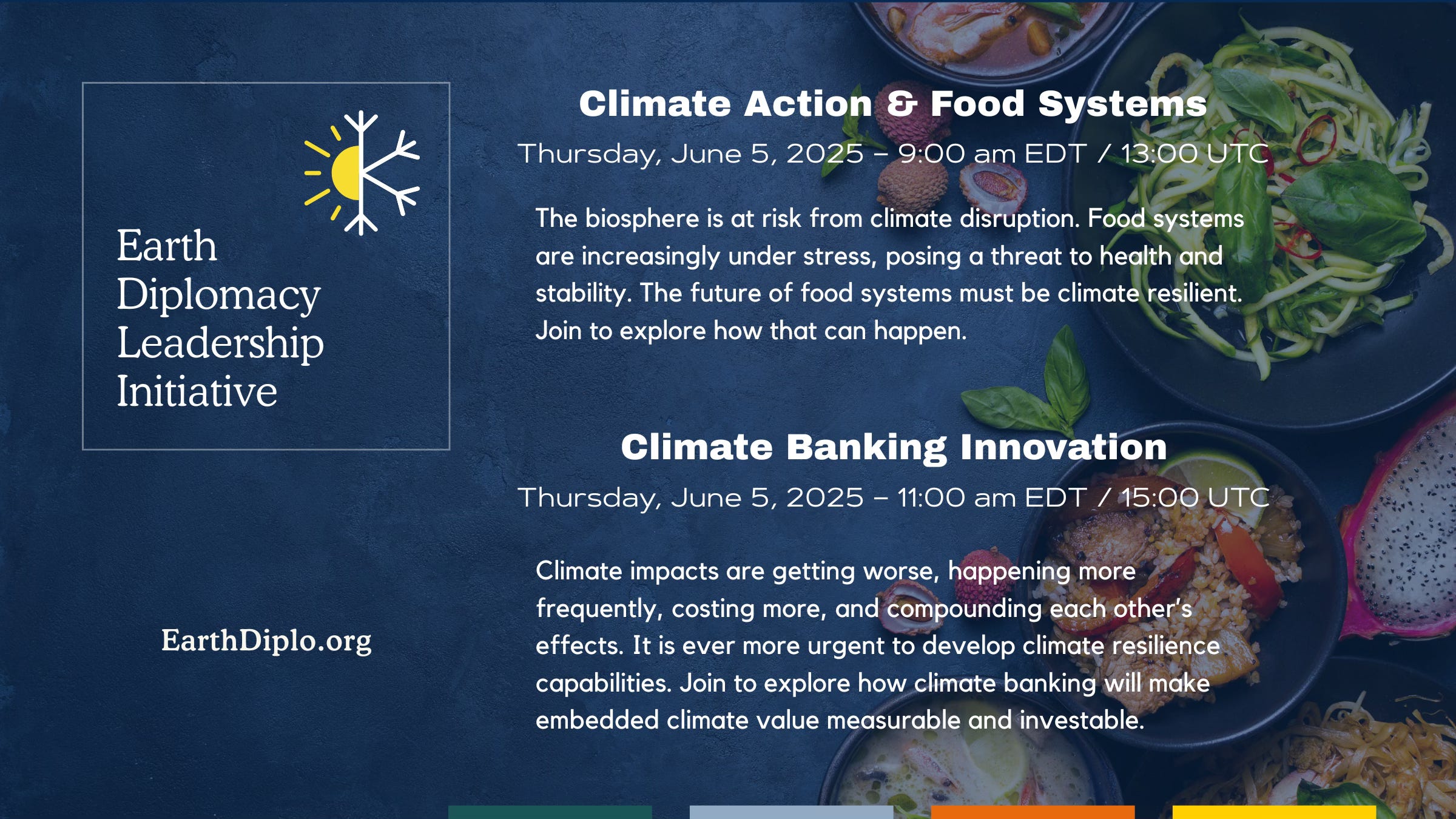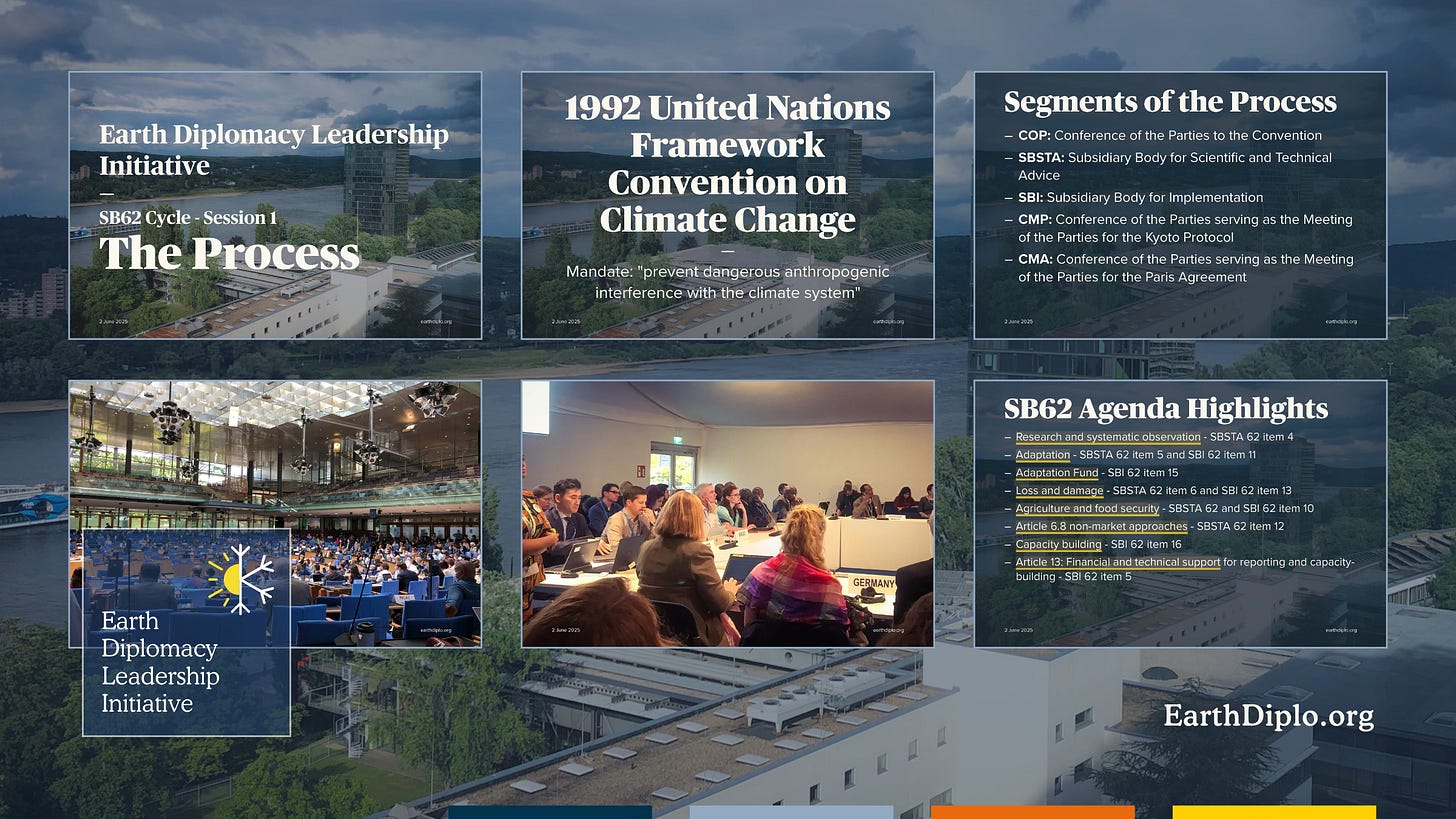June 5 Earth Diplomacy sessions cover Food Systems & Climate Banking
Climate change is advancing rapidly, creating unprecedented, compounding risks and costs. International negotiations need to make climate action mainstream. Food systems and banking can do that.
On Thursday, June 5, to mark World Environment Day, we will hold two sessions for the currently ongoing SB62 cycle of Earth Diplomacy Leadership workshops. One will focus on issues related to the priorities and objectives of the Climate Action and Food Systems Alliance; the other will focus on Climate Banking Innovation. Both are areas of much-needed innovation in policy, finance, standards, and practice, which have unique potential to make value-building climate solutions mainstream.
The everyday economy needs to become the engine of climate risk reduction and resilience-building. For that to happen, we need policies at the local, national, and international levels, that support “mainstreaming”, turning climate goals into everyday practice and local benefits. The projected economic opportunity in achieving this mainstreaming effect runs into the trillions of dollars per year, globally. As dangerous climate disruption unfolds around us, the U.N. Climate Change negotiations are a key decision-space for setting our ambition about how to capture this opportunity and secure a livable future.
Climate Action and Food Systems
Agroecological land use strategies can bring crucial win-win opportunities that produce better outcomes for nature—which can be measured, tracked, and supported with both public and private investment—and diversified development pathways for vulnerable, remote, and front-line communities.
The specific operational strategies that allow agroecology to become a mainstream practice differ in important ways from industrialized agriculture.
Of critical importance is access to Earth systems data, to allow for planting and land stewardship that is both optimized to local circumstances and capable of building investable value.
Local economies can diversify with the emergence of specialized small and medium-scale intermediaries, who effectively translate data into finance and investments into results that benefit human development and planetary health.
Connecting urban food systems to rural landscapes and regenerative land use practices and related business models is another key step in developing mainstream climate-resilient food systems.
The Sharm el-Sheikh Joint Work on the Implementation of Climate Action on Agriculture and Food Security (SJWA) was adopted during the COP27 UN Climate Change negotiations in Egypt, in 2022. The aim was to bridge the work of making food systems climate-resilent with the work of transforming economies to support climate-resilient development. Acting on this emerging agenda could restore nature, spur sustainable development, diversify rural economies, and support climate-smart trade in line with Article 6.8 of the Paris Agreement.
Climate Banking Innovation
Climate impacts are getting worse, happening more frequently, costing more, and compounding each other’s effects. It is becoming ever more urgent for local communities, regional governments, and businesses at the micro, small, and medium scales, to establish climate resilience plans and capabilities. This embedded climate value will need to be measured, supported, sustained, and built on.
Not only will the rise of climate-smart banking make it much easier to identify, mobilize, track, and build on the “all actors” money slated to reach at least $1.3 trillion by 2035; if climate banking reaches mainstream status, the funding allocated to climate solutions will reach far beyond that level, with or without an increase in the stated goal. Most of that money is already held by financial institutions now; it just needs to be realigned to support climate-resilient everyday economics.
The Principles for Responsible Banking provide something of a thought framework for developing a climate-smart banking strategy. We paraphrase the principles here, for context:
Align business strategies with the needs of clients, society, and overall sustainability, including global climate goals.
Reduce negative impacts and improve performance through public target-setting informed by science.
Support clients and customers shifting to more sustainable practices that create shared prosperity for current and future generations.
Consult, engage, and partner with stakeholders to achieve social, sustainability, and climate goals.
Enact governance and culture change to embody these principles in ongoing institutional practice.
Offer transparent reporting of and be accountable for progress, or lack of progress, on social, sustainability, and climate goals.
Climate value banking, or climate banking, will emerge as a layer within existing institutions, a specialized business model among new start-ups, and eventually will become a core feature of mainstream banking services at all levels. This session will begin a wider ongoing dialogue on Climate Banking Innovation, by starting to answer ten substantive questions about mainstreaming climate value.
Visit EarthDiplo.org for the latest updates, as well as background and reporting from the Earth Diplomacy Leadership Initiative.





